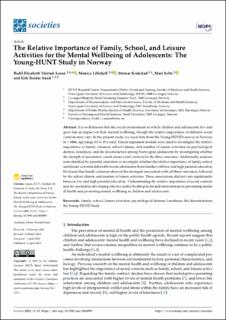| dc.contributor.author | Aasan, Bodil Elisabeth Valstad | |
| dc.contributor.author | Lillefjell, Monica | |
| dc.contributor.author | Krokstad, Steinar | |
| dc.contributor.author | Sylte, Mari | |
| dc.contributor.author | Sund, Erik Reidar | |
| dc.date.accessioned | 2023-06-20T12:17:51Z | |
| dc.date.available | 2023-06-20T12:17:51Z | |
| dc.date.created | 2023-04-12T09:56:56Z | |
| dc.date.issued | 2023 | |
| dc.identifier.citation | Aasan, B. E. V., Lillefjell, M., Krokstad, S., Sylte, M., & Sund, E. R. (2023). The Relative Importance of Family, School, and Leisure Activities for the Mental Wellbeing of Adolescents: The Young-HUNT Study in Norway. Societies, 13(4), 93. | en_US |
| dc.identifier.issn | 2075-4698 | |
| dc.identifier.uri | https://hdl.handle.net/11250/3072302 | |
| dc.description.abstract | It is well-known that the social environment in which children and adolescents live and grow has an impact on their mental wellbeing, though the relative importance of different social contexts may vary. In the present study, we used data from the Young-HUNT4 survey in Norway (n = 8066, age range 13 to 19 years). Linear regression models were used to investigate the relative importance of family cohesion, school climate, and number of leisure activities on psychological distress, loneliness, and life dissatisfaction among Norwegian adolescents by investigating whether the strength of association varied across social contexts for the three outcomes. Additionally, analyses were stratified by parental education to investigate whether the relative importance of family, school, and leisure activities differed between adolescents from families with low and high parental education. We found that family cohesion showed the strongest association with all three outcomes, followed by the school climate and number of leisure activities. These associations did not vary significantly between low and high parental education. Understanding the relative importance of social contexts may be essential in developing effective public health policies and interventions in preventing mental ill health and promoting mental wellbeing in children and adolescents. | en_US |
| dc.language.iso | eng | en_US |
| dc.publisher | MDPI | en_US |
| dc.rights | Navngivelse 4.0 Internasjonal | * |
| dc.rights.uri | http://creativecommons.org/licenses/by/4.0/deed.no | * |
| dc.title | The Relative Importance of Family, School, and Leisure Activities for the Mental Wellbeing of Adolescents: The Young-HUNT Study in Norway | en_US |
| dc.type | Peer reviewed | en_US |
| dc.type | Journal article | en_US |
| dc.description.version | publishedVersion | en_US |
| dc.rights.holder | The authors | en_US |
| dc.subject.nsi | VDP::Samfunnsvitenskap: 200::Psykologi: 260 | en_US |
| dc.source.volume | 13 | en_US |
| dc.source.journal | Societies | en_US |
| dc.source.issue | 4 | en_US |
| dc.identifier.doi | 10.3390/soc13040093 | |
| dc.identifier.cristin | 2140167 | |
| dc.relation.project | Norges forskningsråd: 302705 | en_US |
| cristin.ispublished | true | |
| cristin.fulltext | original | |
| cristin.qualitycode | 1 | |

